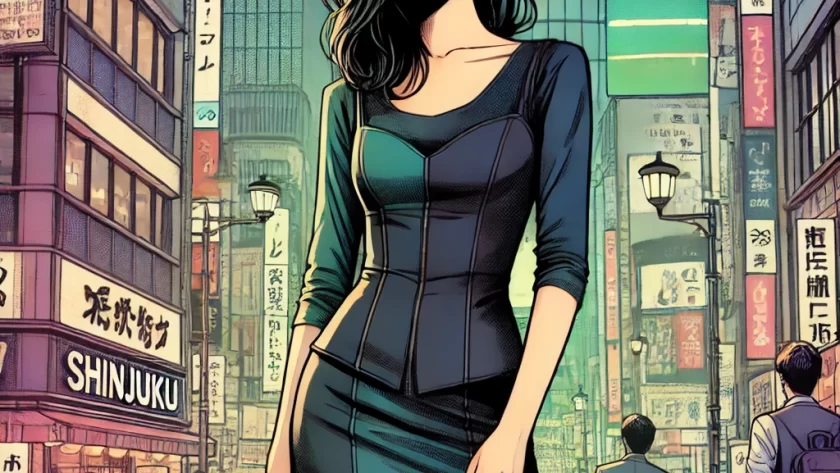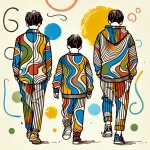歌舞伎町の女王 [Kabukichō No Joō]
椎名林檎 [SHIINA Ringo]
Words & Music : 椎名林檎 [SHIINA Ringo]
First, let’s talk about SHEENA Ringo‘s name. Online, you’ll find both “Sheena Ringo” and “Ringo Sheena,” which can be confusing. “椎名 / Shiina” is her family name. “林檎 / Ringo” means apple. It’s a stage name, clearly not a typical first name (there’s a theory that it’s inspired by Ringo Starr). So, there may be little reason to reverse the usual order of last and first names when converting it to English. Since her music is distributed as “Sheena Ringo,” it seems to be the official stance. Also, though it should be spelled “Shiina” in the traditional Hepburn style, changing it to “Sheena” is likely a deliberate choice to give it a more international feel.
On this site, when writing names in the Japanese order with the family name first, the first name is written in all uppercase. Another example is FUJII Kaze.
SHEENA Ringo debuted as a singer-songwriter in 1998. There are some things you should know to understand her artistic concept. First, the texture of Japan’s underground culture from the 1960s. Its expressions borrow elements from even older Japanese culture. The use of kanji that are no longer in common use in her lyrics is an example of this. Perhaps Jun Togawa was a direct influence on her? She’s an artist who places great importance on such theatrical elements.
And while wrapping herself in such textures, her top-notch musical sense outputs music that is alternative rock, jazzy stuffs, or something that feels like Shōwa-kayō. When she debuted, many young people were captivated by her overwhelming expressiveness.
“Kabukichō no Joō” is the second single from her first album.
- 歌舞伎町(かぶきちょう) [Kabukichō] : Kabukichō
- 女王(じょおう) [joō] : queen
Kabukichō is Japan’s largest entertainment district, located in Shinjuku wiki, Tokyo. In addition to restaurants, there are host and hostess clubs wiki, adult entertainment venues, love hotels, pachinko parlors, and more, earning it the nickname “Sleepless Town.” It’s also known for being a base for many yakuza organizations.
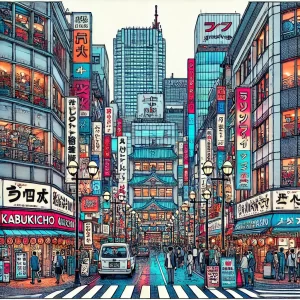
蝉の声を聞く度に 目に浮かぶ九十九里浜
semi no koe o kiku tabi ni me ni ukabu Kujūkuri-hama
皺々の祖母の手を離れ 独りで訪れた歓楽街
shiwashiwa no sobo no te o hanare hitori de otozureta kanrakugai
- 蝉(せみ) [semi] : cicada
- 声(こえ) [koe] : voice
- 聞く (きく)[kiku] : hear
- たび [tabi] : every time
- 目(め) [me] : eye
- 浮かぶ(うかぶ) [ukabu] : come to mind
- しわしわな [shiwashiwa na] : wrinkled
- 祖母(そぼ) [sobo] : grandmother
- 手(て) [te] : hand
- 離れ(はなれ) [hanare] : leave
- 一人 (ひとり)[hitori] : alone
- 訪れる(おとずれる) [otozureru] : visit
- 歓楽街(かんらくがい) [kanrakugai] : entertainment district
(translation) “Every time I hear the cicadas’ voices, Kujūkuri Beach comes to mind.
Leaving my wrinkled grandmother’s hand, I visited the entertainment district alone.”
Kujūkuri Beach is a large coast in Chiba Prefecture wiki. From the overall lyrics, we can imagine a story of a child raised by a grandmother living there, who one day decides to visit Kabukichō.
ママは此処の女王様 生き写しの様なあたし
mama wa koko no joō-sama ikitsushi no yō na atashi
誰しもが手を伸べて 子供ながらに魅せられた歓楽街
dareshimo ga te o nobete kodomo nagara ni miserareta kanrakugai
- ママ (まま)[mama] : mama
- ここ [koko] : here
- 女王(じょおう) [joō] : queen
- 様(さま) [sama] : title (honorific)
- 生き写し(いきうつし) [ikitsushi] : spitting image
- あたし [atashi] : I
- 子供 (こども)[kodomo] : child
- 魅せられる(みせられる) [miserareru] : be fascinated
(translation) “Mama is the queen here, and I’m her spitting image.
Everyone reached out their hands, fascinated by the entertainment district even as a child.”
“あたし / atashi” is a more casual first-person pronoun compared to “わたし / watashi.” It’s mainly used by women and is a word SHEENA Ringo often uses.
十五になったあたしを 置いて女王は消えた
jūgo ni natta atashi o oite joō wa kieta
毎週金曜日に来ていた男と暮らすのだろう
maishū kinyōbi ni kiteita otoko to kurasu no darou
- 十五(じゅうご) [jūgo] : fifteen
- 置いて(おいて) [oite] : leave behind
- 消える(きえる) [kieru] : disappear
- 毎週(まいしゅう) [maishū] : every week
- 金曜日(きんようび) [kinyōbi] : Friday
- 来る(くる) [kuru] : come
- 男(おとこ) [otoko] : man
- 暮らす(くらす) [kurasu] : live
- だろう [darou] : probably
(translation) “The queen disappeared, leaving me behind at fifteen.
She’s probably living with the man who came every Friday.”

「一度栄えし者でも必ずや衰えゆく」
ichido sakaeshi mono demo kanarazu ya otoroeyuku
その意味を知る時を迎え足を踏み入れたは歓楽街
sono imi o shiru toki o mukae ashi o fumiireta wa kanrakugai
- 一度(いちど) [ichido] : once
- 栄える(さかえる) [sakaeru] : flourish
- 必ず [kanarazu] : inevitably
- 衰える(おとろえる) [otoroeru] : decline
- 意味(いみ) [imi] : meaning
- 知る(しる) [shiru] : know
- 時(とき) [toki] : time
- 足(あし) [ashi] : foot
- 踏み入れる(ふみいれる) [fumiireru] : step into
(translation) “‘Even those who once flourished will inevitably decline.’
When I realized the meaning of those words, I stepped into the entertainment district.”
消えて行った女を憎めど夏は今
kieteitta onna o nikumedo natsu wa ima
女王と云う肩書きを誇らしげに掲げる
joō to iu katagaki o hokorashige ni kageru
- 女(おんな) [onna] : woman
- 憎む(にくむ) [nikumu] : hate
- 夏 (なつ)[natsu] : summer
- 今 (いま)[ima] : now
- 肩書き(かたがき) [katagaki] : title
- 誇らしげ (ほこらしげ)[hokorashige] : proudly
- 掲げる(かかげる) [kageru] : raise
(translation) “Though I hate the woman who disappeared, summer is now.
I proudly raise the title of ‘Queen.'”
女に成ったあたしが売るのは自分だけで
onna ni natta atashi ga uru no wa jibun dake de
同情を欲したときに全てを失うだろう
dōjō o hoshita toki ni subete o ushinau darou
- なる (なる)[naru] : become
- 売る (うる)[uru] : sell
- 自分 (じぶん)[jibun] : self
- 同情(どうじょう) [dōjō] : sympathy
- 全て(すべて)[subete] : everything
- 失う(うしなう) [ushinau] : lose
(translation) “Now that I’ve become a woman, all I sell is myself.
When I seek sympathy, I’ll probably lose everything.”
JR新宿駅の東口を出たら
JR Shinjuku-eki no higashi-guchi o detara
其処はあたしの庭 大遊戯場歌舞伎町
soko wa atashi no niwa dai-yūgijō Kabukichō
- 駅(えき) [eki] : station
- 東(ひがし) [higashi] : east
- そこ [soko] : there
- 庭(にわ) [niwa] : garden
- 遊戯(ゆうぎ) [yūgi] : amusement
(translation) “When you exit JR Shinjuku Station’s east exit,
There lies my garden, the grand playground of Kabukichō.”
Shinjuku Station google map has an average daily ridership of about 3 million, making it the world’s busiest station according to the Guinness World Records. If you exit the west gate, getting to the east gate can be extremely difficult—a nightmare. Well, it might be a bit easier now. In Tokyo’s train stations, knowing which exit to head for is crucial.
By the way, “遊戯 / yūgi” refers to the word used in “Yu-Gi-Oh wiki.” The “Oh (ō)” in Yūgi-Oh means “king,” just like the “ō” in “女王 / joō.”
- 王(おう) [ō] : king
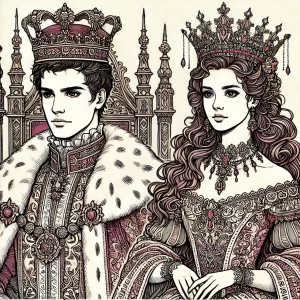
今夜からは此の町で娘のあたしが女王
kon’ya kara wa kono machi de musume no atashi ga joō
- 今夜 (こんや)[kon’ya] : tonight
- 娘 (むすめ)[musume] : daughter
(translation) “Starting tonight, I, the daughter, am the queen of this town.”
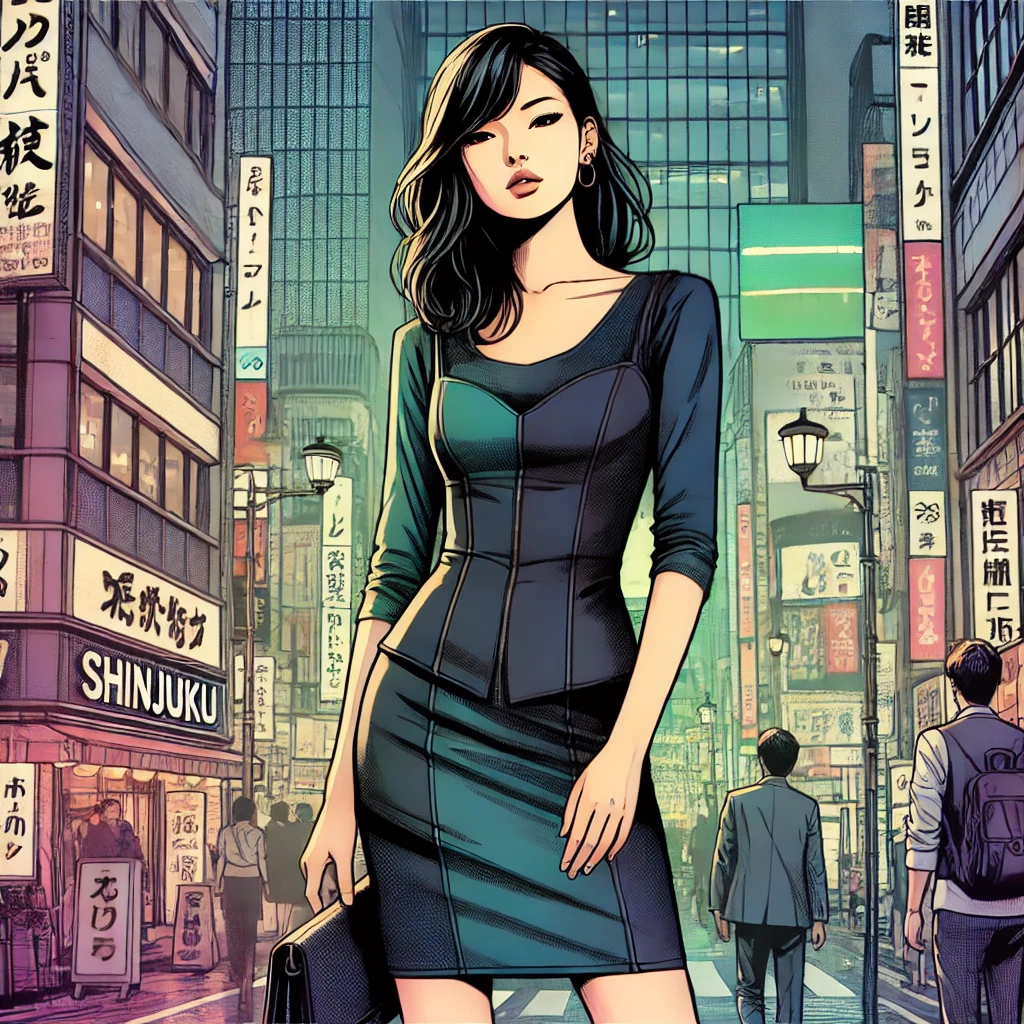
This “queen” is likely a “hostess” at a hostess club.
While many real place names appear, the story in the lyrics doesn’t overlap with SHEENA Ringo’s life at all. She’s from Fukuoka wiki, after all. However, as soon as you see her artwork for this song or her performances, you immediately get immersed in that world.
That said, there aren’t many of her songs with as clear a storyline or lyrical content as this one.
Tomorrow, I’ll cover another SHEENA Ringo song.
Thanks for reading! Feel free to comment if you have any feedback or questions.
Follow me on X.
